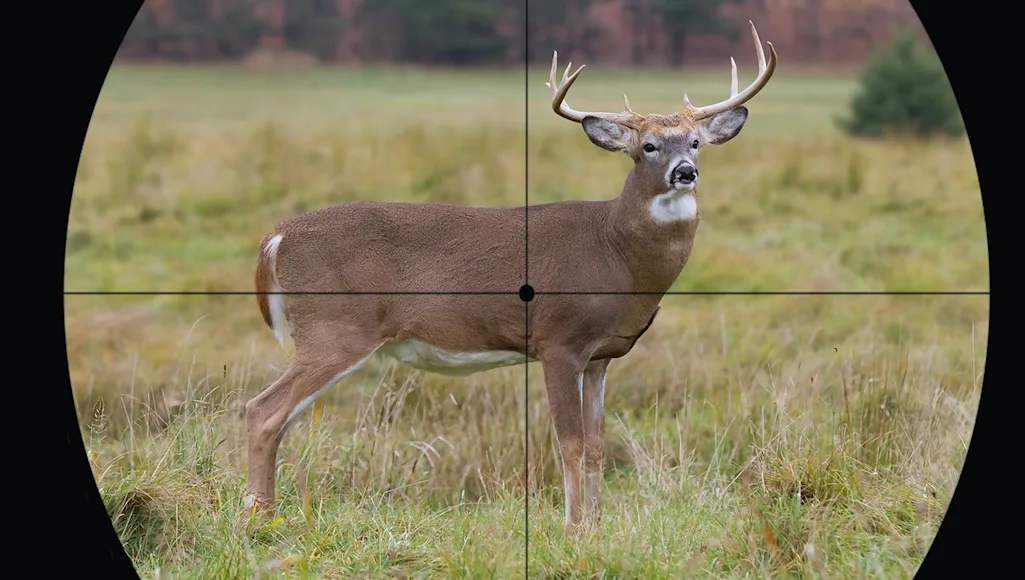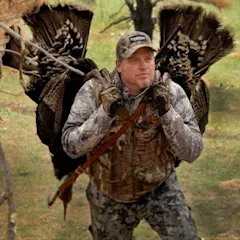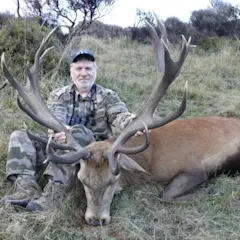We may earn revenue from the products available on this page and participate in affiliate programs. Learn more ›
You’d think the question of where to shoot a deer for your best odds at taking home venison would be fully settled and crystal clear by now, given how long humans have been shooting at deer. But it isn’t. Among rifle hunters, you have your high-shoulder shooters, your behind-the-shoulder shooters, and even a few old-school neck-shooters. It’s even worse among bowhunters. Where to shoot a deer with a bow or crossbow has probably never been more hotly debated than it is right now.
But there’s good news here—and, ironically, a lot of clarity too. Because almost all of the different aiming points hunters put up as the best are, if fact, very good places to aim. And which one is actually the best usually depends on your own preferences, circumstances, or goals. So, here’s a breakdown of where to shoot a deer, including four of the best aiming points for gun hunters, four of the best aiming points for bowhunters, and a number of places never to aim for.
Where to Shoot a Deer: The Basics
The short answer to where to shoot a deer is in the heart-and-lung vital area, which basically sits between and extends a little way behind the two front shoulders, about mid-body on the vertical plane. The heart proper sits low and tight to the shoulder crease, if not a little ahead of it. The lungs lie between the shoulders but also extend rearward about a third of the way into the flank. While it is true that you can kill a deer, and quickly, with other shots, the heart-and-lung vital area gives you the best odds of a quick, humane kill while also giving you the most room for error. It’s where virtually all gun and bow hunters aim at a deer, but they go about it a little differently. So, let’s take a closer look.
Table of Contents
Where to Shoot a Deer with a Gun
The Behind-the-Shoulder Lung Shot
High-Shoulder Shot
Face-On Chest Shot
Back of the Neck Shot
Where to Shoot a Deer with a Bow
Behind the Shoulder
The Vital-V Shot
Far-Shoulder, Quartering-Away Shot
Two Quartering-To Shot Options
Best Bullets and Broadheads
Where Not to Shoot a Deer
Where to Shoot a Deer with a Gun
I began hunting deer more or less in the middle of the previous century and have been pretty busy at it ever since. Having watched a great many deer go down, I can tell you with reasonable certainty where to shoot a deer and what kind of bullets to use, but if I, or anyone else, tries to tell you that thus and such happens every time, without fail, they’re full of it. That said, deer are not hard to kill. They’re not big, or heavy boned, or thick-hided, like elk, and they lack an elk’s fantastic will to run even when fatally shot. Nonetheless, you have to do it right. Here are four shots that deer hunters can rely on.
1. The Behind-the-Shoulder Lung Shot

The behind-the-shoulder shot ruins minimal meat. You’ll want a fast-expanding bullet. Jim Cumming / Getty
This is the true Money Shot. The lungs are a very big target, and if you wreck one or both, you’ll have yourself a deer. Put the crosshair one third to halfway up the body, just behind the foreleg, PICK A SPOT TO AIM AT, and squeeze. You’ll get at least one lung, and probably both, and you may well hit the heart as well. This is the one shot where I’m happy with a quick-expanding bullet. There’s nothing anatomical to keep it from doing its job, and of all the shots you can make, this one destroys the least usable meat. For ammo, two good options here are the Browning BXR and Winchester Deer Season.
2. High-Shoulder Shot
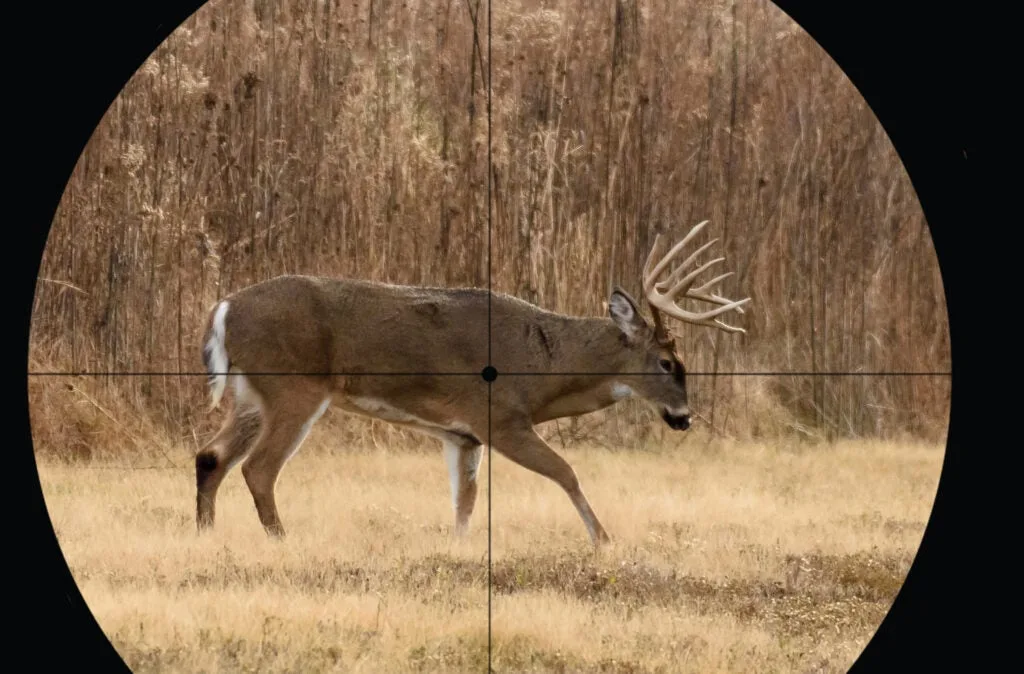
Compared to behind the shoulder, the high-shoulder shot is more likely to drop deer in their tracks. Use a controlled-expansion bullet. Larry Keller, Lititz Pa. / Getty
As I said earlier, I am a tough-bullet guy, and as such, this is the shot I prefer. Bring the crosshairs one-half to two-thirds up the body and put them a bit forward of the center of the shoulder. This will get the lungs for sure, and it will very likely wreck the shoulder blade and some of the spine as well. A deer that has sustained this kind of damage can manage to run a few yards, but that’s it.
3. Face-On Chest Shot
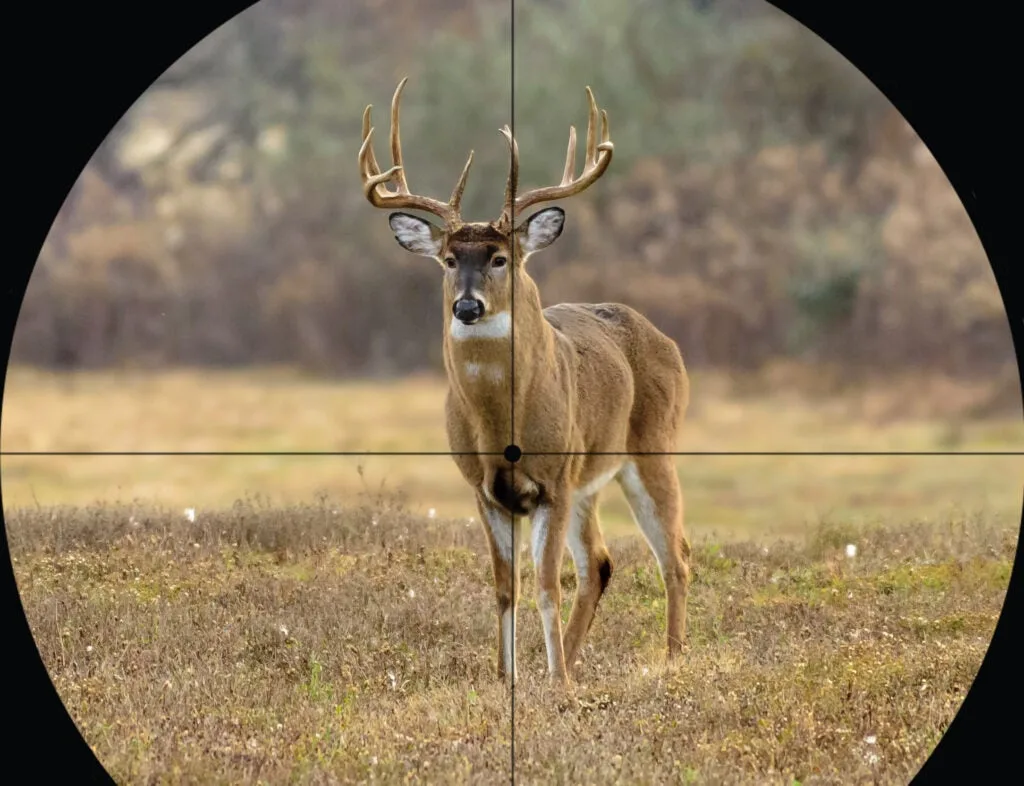
If a deer is facing you, aim for the middle of the chest. Larry Keller, Lititz Pa. / Getty
This, I think, is the most effective one of all. If a deer is facing you, aim smack in the middle of the chest and send it. The bullet will take out both lungs and the heart. I may have had a few deer run a few yards when I got this shot, but I can’t recall any. The most typical was a big Maine deer that I got at 270 yards. It simply sagged sideways and was caught by a fallen tree. It never touched ground. If your buck is quartering toward you, aim for the point of the shoulder, which will also give you a short and easy blood-trailing job.
4. Back of the Neck Shot
I don’t like neck shots from the side or an angle and will not take them. You’re shooting at a mass of muscle that conceals some comparatively small arteries and a spinal column that is maybe the size of your thumb. If you get either one, you may pat yourself on the back. Most likely, you’ll produce a massive flesh wound that will allow the deer to escape and die in agony. In this case, feel free to kick your own ass.
However, if you find a deer that’s facing directly away, and you’re using a strong bullet, aim at the base of the neck, dead center. You’ll get the spine, which is bigger than the neck’s spinal column, and the animal will go down in its tracks. —David E. Petzal
Where to Shoot a Deer with a Bow
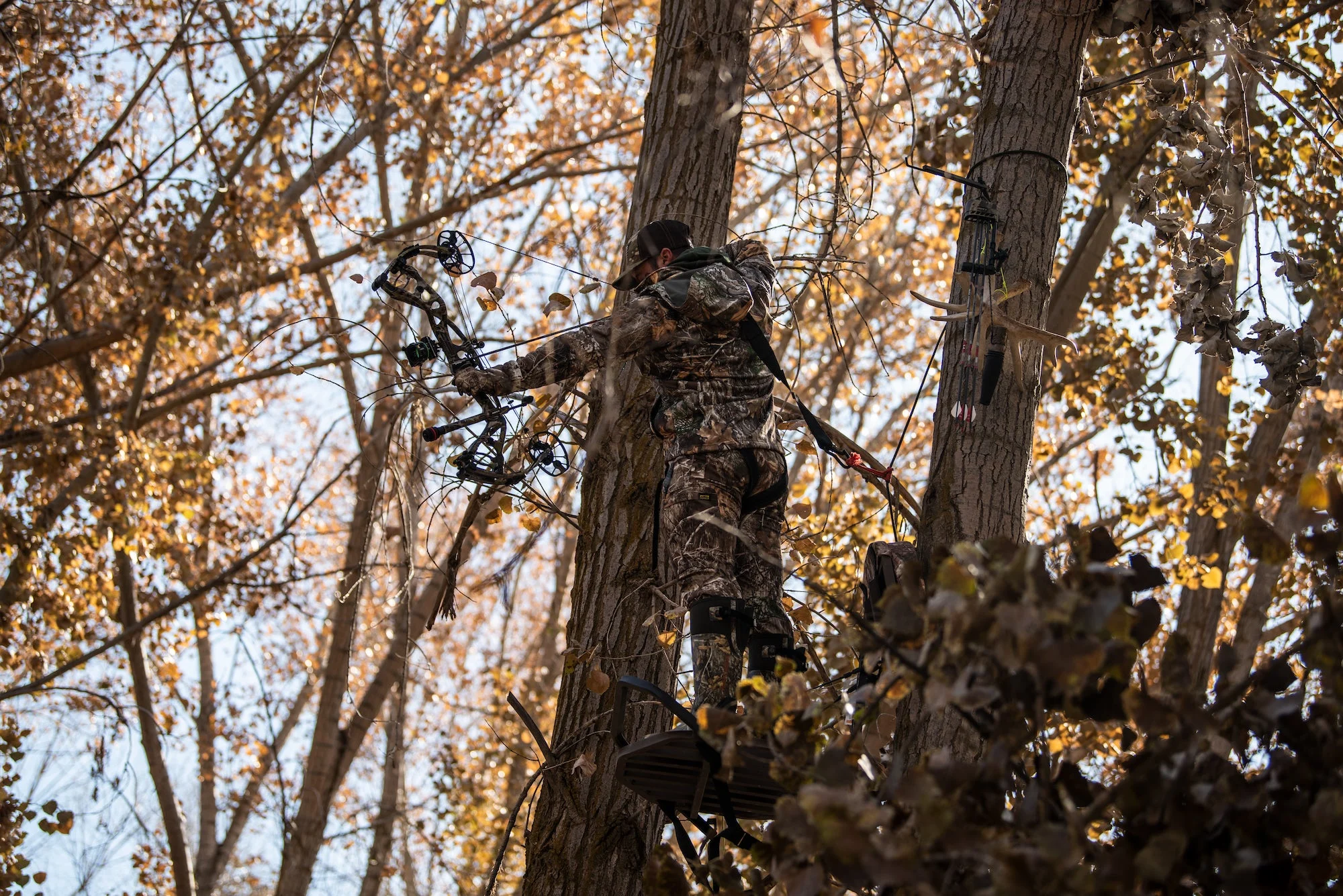
A bowhunter takes aim. Hoyt
I’ve been bowhunting deer since the 1990s and have been around bowhunters since long before that, and from the very beginning there has been one rule of arrow placement that has stood above all others: Whatever you do, do not hit the shoulder! For decades, it’s been taken as gospel that any arrow that hits a deer’s leading shoulder, no matter the angle, will not penetrate enough to kill, and all of the traditionally accepted aiming points for bowhunters are built around the idea of hitting a deer’s vitals while avoiding the shoulder.
Many, many bowhunters still follow the old rule, myself included. A contingent of new-school bowhunters, however, argue that the shoulder ain’t so scary, after all, and that the very best place to aim—an area called the Vital V—is actually in front of the shoulder crease instead of behind it. The whole business has ignited a raging debate in the bowhunting world, but the real truth is that it ain’t worth getting your shorts in a bunch, because neither faction is wrong. As you’ll see below, the aiming points both recommend are on our list of the four best places to shoot a deer with a bow.
1. Behind the Shoulder
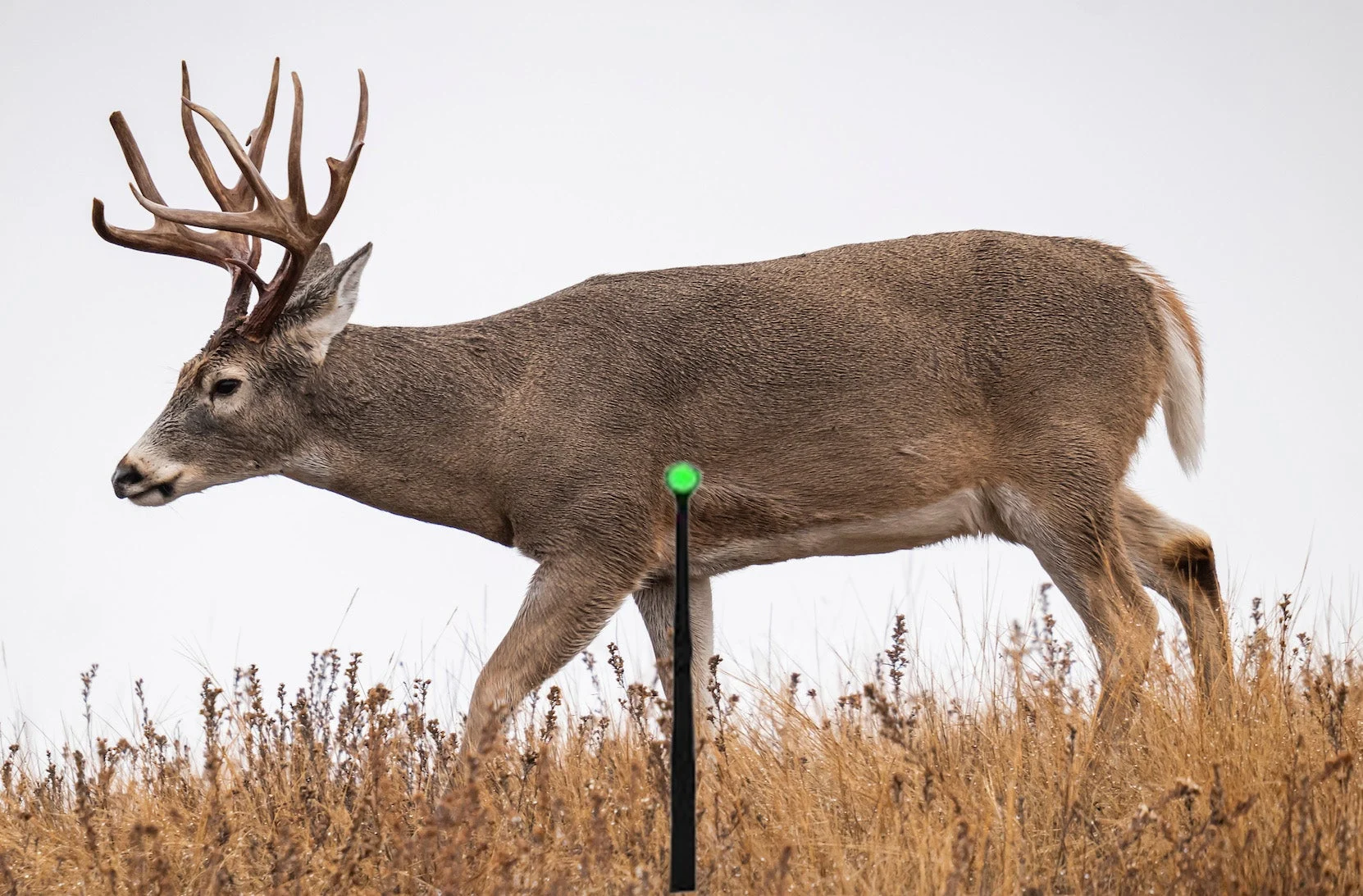
The traditional aiming spot for bowhunters on a broadside deer is just behind the shoulder crease. John Hafner Photography
This is the old-school shot, and it has a long, long record of success. On a broadside deer, you put the pin an inch or two behind the shoulder crease, and shoot. This aiming point keeps you well away from any shoulder bones, sends your arrow smack through both lungs, and offers a fair amount of forgiveness, too. If you hit, say, 6 inches back, you’re still easily into both lungs. And, as the Vital-V proponents argue (see below), there’s some room ahead of the shoulder crease, too, (as long as you’re not too high) that will avoid any shoulder bones and center-punch the heart-and-lung area.
2. The Vital-V Shot
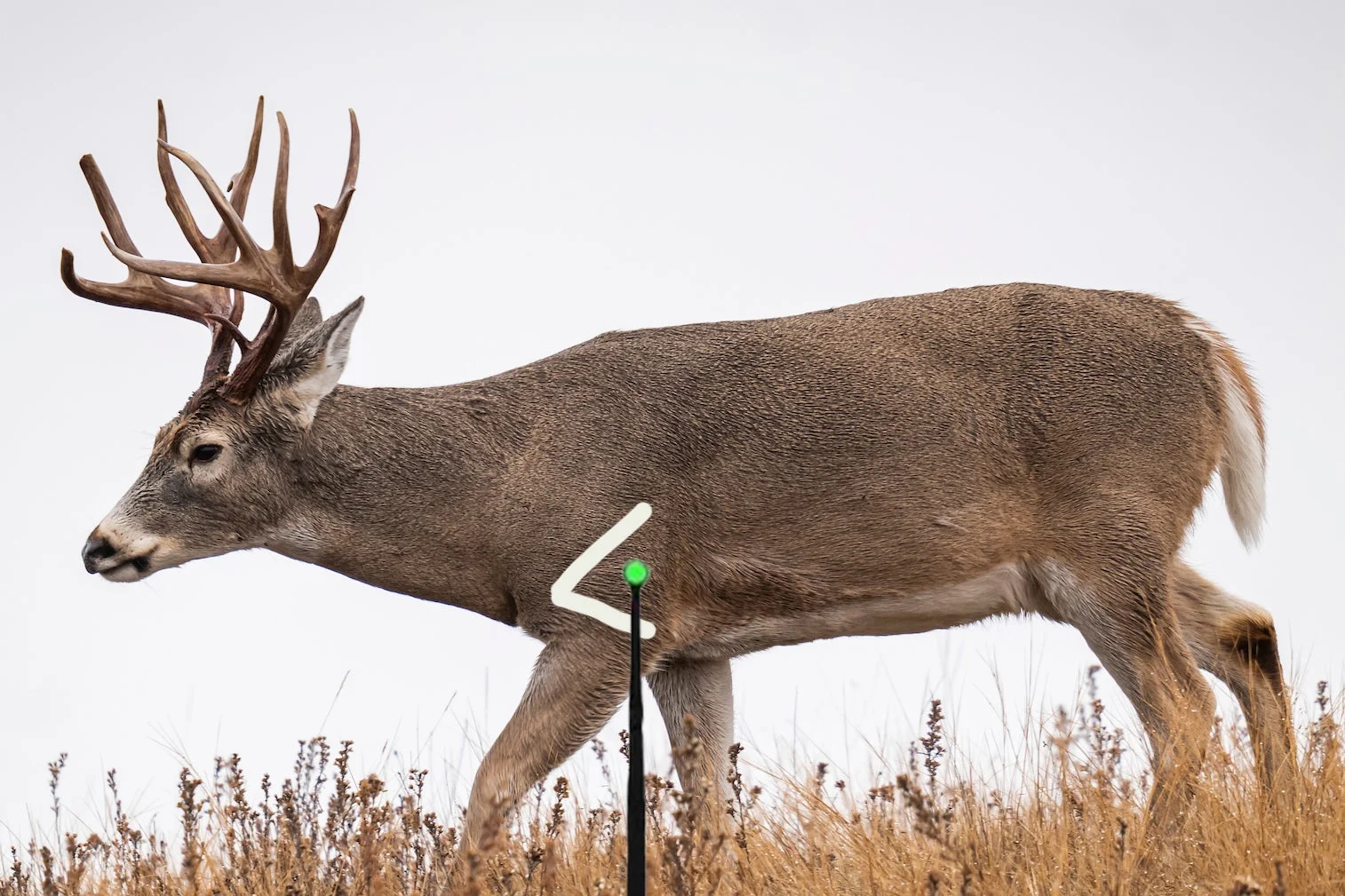
The trailing edges of the scapula and humerus bones form a V just ahead of the shoulder crease that is widely called the “Vital V.” John Hafner Photography
The new-school place to aim at a broadside deer is the Vital V, and even though I’m a behind-the-shoulder guy, I concede that this is every bit as deadly and that the argument for it is perfectly sound. To make that argument, I’ll quote my buddy, F&S hunting editor, and Vital-V proponent, Will Brantley: “The deadliest place to hit a deer is in the forward section of the lungs, through the major pulmonary vessels and the top of the heart. Right through the Vital V, in other words. Hit that, and the deer will rarely make it out of sight.”
Brantley concedes that you will hit bone if you’re a little high or a little forward but that those bones aren’t that difficult to penetrate if you’re shooting a heavy, high-F.O.C. arrow and a tough, fixed-blade broadhead. I still like the old-school behind-the-shoulder-crease shot because, to me, it’s proven deadly and offers more forgiveness. But that’s just me.
3. Far-Shoulder, Quartering-Away Shot
Probably the best shot a bowhunter can get at a deer is a quartering-away shot. This angle allows you to drive an arrow right up into the heart-lung area while easily avoiding the near shoulder. Of course, on this shot, you have to aim a little farther back. The question is, how far back? And the best answer is to not think of it that way, because how far back depends on the angle of the deer. Instead, just aim to shoot through the deer and hit the far shoulder. Follow the far leg up to mid-body, shoot, and if your arrow goes where you’ve aimed, you’ve got a double-lung and possibly heart shot, too, and you’ll be standing over that buck in a matter of minutes.
4. Two Quartering-To Shot Options
If a deer is quartering-to slightly, you can aim very tight to the shoulder crease, or at the Vital-V area, and expect to pierce both lungs and have a short tracking job. That said, most bowhunters will not take the shot if the deer is quartering at too hard an angle. How hard is too hard? It’s a bit of a judgement call, but as I see it, the key is to focus on where your arrow will exit. If it will exit too far back for you to be confident that you’ll get both lungs, don’t shoot. Some of the new-school shooters, with their heavy, high-F.O.C arrows and fixed heads that penetrate deeply, will take a hard-quartering-to shot by aiming in the soft-spot crease between the chest and the shoulder, with the arrow exiting behind the far shoulder. I know for sure that this can be deadly, but being a bit old-school and conservative in this regard, I avoid this shot. —Dave Hurteau
Where to Shoot a Deer: The Best Bullets, Arrows, and Blades
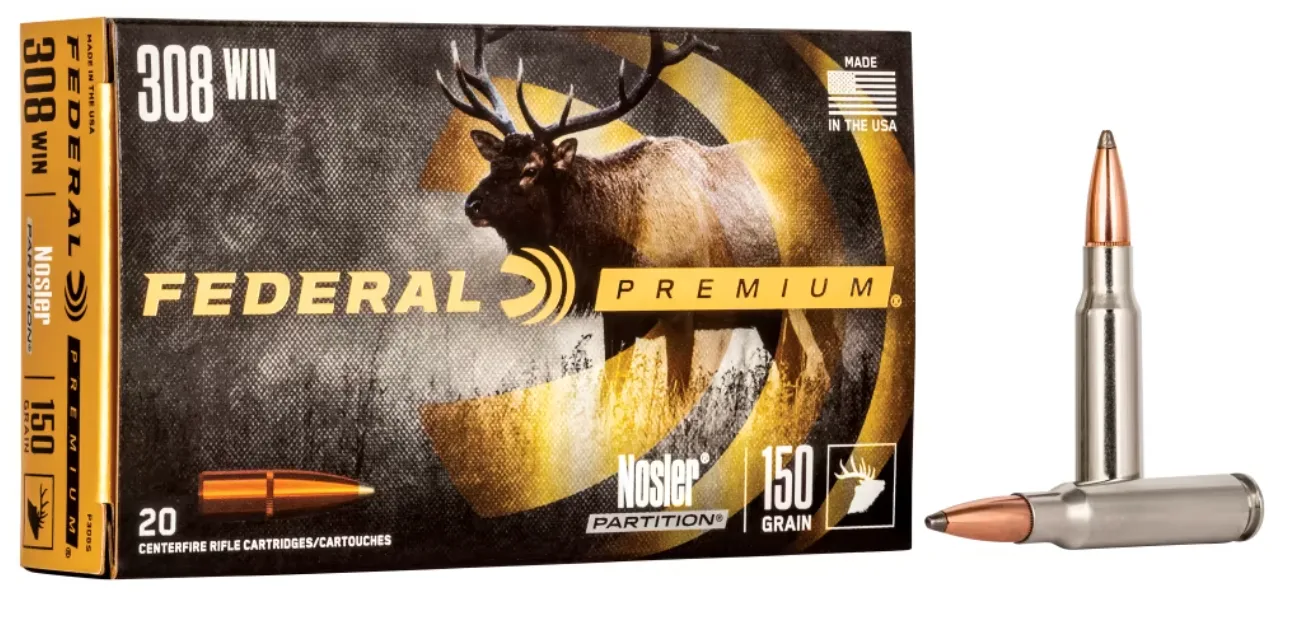
Federal’s Nosler Partition load is a good choice for deer. Bass Pro Shops
For rifle hunters, the cartridge you choose is less important than your choice of bullet and your ability to shoot said bullet accurately. I’ve killed deer with everything from a .223 to a .340 Weatherby, and everything in between, and have seen no evidence that one cartridge is more effective than another. But I’ve seen a lot of difference in the way bullets do their job.
Because of the nature of my profession, I’ve used both tough bullets and quick-expanding bullets on deer because I was required to see how everything performed, and after seeing what I’ve seen over half a century, I’m a tough-bullet guy all the way. If you’d like me to name names, here’s what I prefer: Barnes TSX all-copper, Swift Scirocco (maybe the best all-around bullet of all), Swift A-Frames, and Nosler Partitions. They get through to the vitals, they break bones if you have to break them, and they give you an exit wound and a blood trail without fail. —D.E.P.
For bowhunters, there is a clear trend toward fairly heavy micro-diameter arrows with a high F.O.C. (extra weight up front). There are a few advantages, but the main one for this conversation is that they penetrate more deeply. This is absolutely what you want if you’re going to shoot at the Vital-V, and you’ll want to tip that arrow with a tough, fixed-blade head. If, however, you are going to aim behind the shoulder on a broadside deer, you may want to go with a wide-cutting mechanical head, which is what I’ve come to favor. That said, I still use the sort of arrow described above. Why? Because if I mistakenly hit a little too far forward, I want that extra penetration.
Where To Shoot a Deer: Three Shots to Avoid
With a bow, you really should avoid any shots that are not described above. With a gun, you have a bit more latitude, which can temp people to take shots they shouldn’t. Here are three to avoid.
Head Shots
Do not take a head shot of any kind with gun or bow The head is a small target, and even if the deer drops, you have a ghastly mess that disrespects the animal. Much worse, you could shoot away the lower jaw, and then the creature will live for a long time in unspeakable pain. I friend of mine, an ethical hunter, did this to an elk by accident and was unable to find the beast and end its suffering. It haunted him until his dying day.
Base of the Tail Shot
Shooting at the root of the tail, or the Texas Brain shot, as I’ve heard it called, is sometimes recommended as a means of keeping a wounded animal from escaping. If you’re a cool and expert shot, and can hit the base of the spine, it will indeed drop the animal’s hind legs and you can finish him off. If you’re not a cool and expert shot, you’ll likely hit the guts instead. You should never take this one as your initial shot.
Any Unsure Shot
Finally, if you don’t like the shot you have at the moment, take your finger off the trigger and wait. Deer are never still for more than a couple of seconds, and your angle will change. However, you have to be able to read whitetail body language. If the critter you’re aiming at is serene and at easy (at least as far as deer get to be like that) you can afford to watch. If the deer is looking right at you, tensed like a spring, ears forward, hoof stamping the ground, it’s time to shoot if you have a good shot or not shoot if you don’t. —D.E.P.

